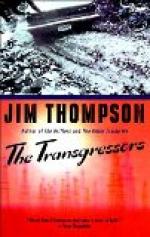“James Golding, accompanied by M. Tabort, French Banking Magnate, entered rear car, Paris express for London, to cross the channel. Car uncoupled in tunnel. Explosion. Both men instantly killed. Sub-marine tunnel wrecked.”
“Send this message to the New York Javelin,” are his instructions to the operator. “Rush it, and I will give you a hundred francs.”
“Cable is engaged,” is the reply. “Orders from London.”
“What news is London sending over this cable?”
“None. It seems strange to keep the cable tied up, when there is such important news to be sent. But the instructions are, ’Send no messages to the United States.’ I’m sending an unimportant House of Commons speech.”
“Your wire is free, then? I’ll give you a thousand francs if you will send this one message through,” Nevins urges persuasively. “I want to get the news to my paper. They will pay royally for it.”
The operator hesitates. A thousand francs is a tempting offer.
“When will you pay?” he asks.
“I will pay you now, on the very spot.”
As he speaks Nevins counts out the bills.
It is twenty minutes of eight by the local clock in
the cable office.
The clock indicating New York time registers two-forty
P.M.
A glance at the Bank of France notes decides the question in the operator’s mind. He takes the money and transmits the message.
Nevins returns to his room to await the developments of the thirteenth of October.
BOOK IV.
In Freedom’s Name.
CHAPTER XXIV.
THE SYNDICATE IN LIQUIDATION.
The crisis has arrived. On the bulletins in front of the leading newspaper offices in New York crowds congregate. Men discuss the startling tidings that come from all points of the compass and ask themselves what the next report will be. Golding’s death is the forerunner of a long list of fatalities.
JAVELIN BULLETIN.
United States Senator Warwick,
of California, was assassinated at
his villa in San Diego.
The murderer, after shooting the Senator, turned the smoking pistol upon himself and died with his victim.
This bulletin is posted on the board in front of the Javelin office.
“What’s happening?” asks one of the crowd of the man at his side. “Is this a wholesale butchery planned by Anarchists, or is it a plot of the Mafia?”
“God only knows,” is the reply.
And to the thousands who stand waiting with breathless excitement for the next announcement the inability to locate the source of the outburst of violence is quite as complete as this man’s. They realize that a series of appalling crimes has been committed; yet none can ascribe the least pretext for them.
The name of one after another of the leading magnates of the land is posted as the victim of a simultaneous homicide, and the notion that it is the work of anarchists begins to prevail.




